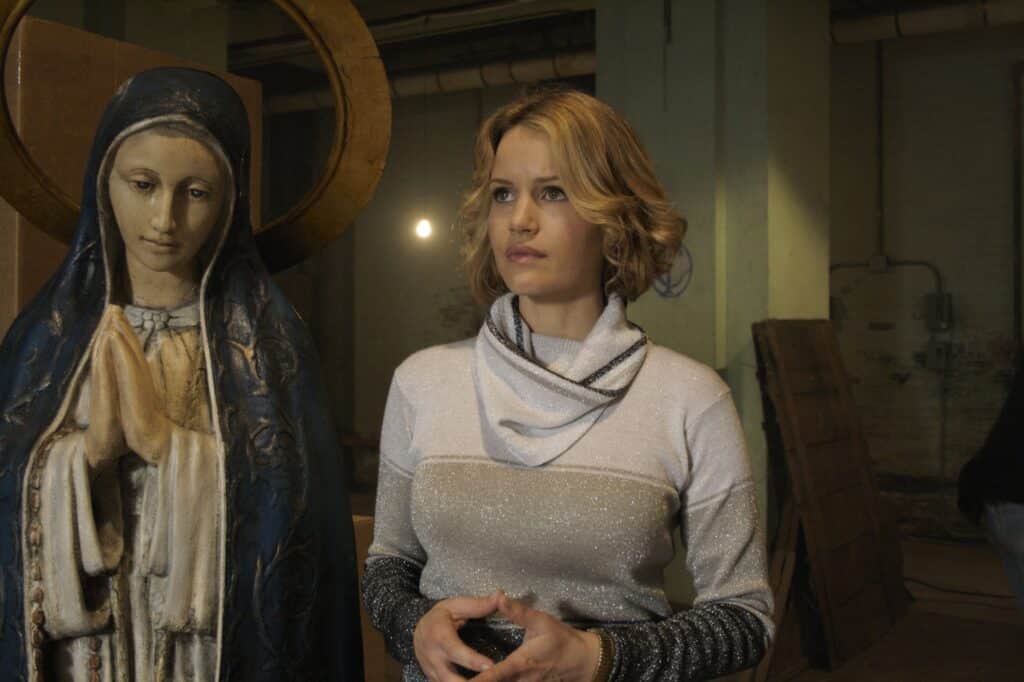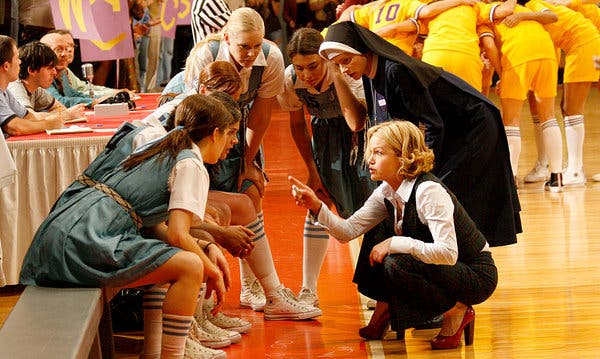After March 19, 1972, women’s basketball would never be the same. On that day, Immaculata College, a tiny, Catholic women’s school located on a bucolic suburban campus just outside of Philadelphia, with an enrollment of just 550 and run by the Immaculate Heart of Mary (IHM) sisters, would win the first-ever women’s national college basketball championship. They would forever change the look and culture of the women’s game.
In the 1960s, the women’s college game was barely a blip on the sports fan’s radar screen. The game seemed more like a friendly pastime rather than serious, competitive sport. Girls wore floppy tunics with box pleats dresses, really and were for the most part unathletic. They played a rigidly restrained game in cramped gymnasiums in which even the number of dribbles was controlled.
In fact, some schools were still playing with two sets of teams stationed on both sides of the court at the same time one for offense and one for defense. The schedules were lousy, there were no scholarships and there was no entertainment value. The universal cry: No one wants to watch girls play.
“College basketball was a men’s club, ” emphasizes Cathy Rush, the Hall of Fame coach who led Immaculata to that seemingly impossible 1972 national title. “Look, games were played on Monday afternoons at three o’clock. Nobody but the parents and a few friends even came. Nobody cared about women’s basketball. It was just our little thing. “
At the time, the women’s game didn’t even operate under the NCAA umbrella but was regulated by something called the Association for Intercollegiate Athletics for Women (AIAW), the first organization to govern women’s collegiate sports. So, yes, Rush is right: College basketball was a distinctly men’s game.
Until that day almost 40 years ago. When the Immaculata team returned home in March of 1972 after winning the national title, the question was instantly raised: How many men are on Philadelphia’s best college basketball team? The answer: none.
The Immaculata basketball team was dubbed the Mighty Macs. Forty years later, the Mighty Macs have gone Hollywood.
A Film is Born
On October 21, in a red-carpet premiere, the Cinderella story of the 1972 Immaculata College basketball team’s season-in-the-sun opened in movie theatres across the nation to coincide with the 40th anniversary of women’s basketball’s first championship season. The Mighty Macs, the film, directed by Tim Chambers and starring Carla Gugino, David Boreanaz and Ellen Burstyn, is a family-friendly film. The movie has already won six film festival awards, including “Best Picture ” from the prestigious International Family Film Festival.
Cugino, who starred in the big-screen movie Night at the Museum, plays Immaculata coach Cathy Rush. Boreanaz, a Philadelphia native who stars in Fox TV’s Bones, plays Rush’s husband, Ed. Burstyn, one of the few actresses who has won an acting triple crown an Oscar, an Emmy and a Tony plays the president of the college, Sister Mary of Lourdes.
Chambers, Philadelphia born, bred and educated a product of Catholic elementary school, Catholic high school and the University of Pennsylvania came up with the idea in 2007 to make a movie of the Mighty Macs. He peeled the onion to find the immortal story line.
“When you are trying to evaluate whether a story works, you have to find out if it’s about something else than simply sport, ” says Chambers. “Look at Remember the Titans it’s about race relations; look at Miracle it’s about the Cold War. The Mighty Macs is about strong women and their commitment, sacrifice and faith in buying into the vision and dreams of their coach it’s about strong women who aren’t afraid to have their own dreams. That story line is as universal today as it was in 1972. It definitely translates to beyond a local Philly feel-good story. “
Chambers understood that having solid material to work with was only the beginning. Far more important was the way he shaped and shifted the material in the film to make it intersect with today’s cultural moment. The Mighty Macs marks Chambers’s feature-film directing debut.
Initially, Chambers had some trouble getting seed money to finance the film. When he received a hefty financial lift from Pat Croce, the former president of the NBA Philadelphia 76ers, the movie was on full go. “I had a chance to sell the script to some mainstream Hollywood producers, ” says Chambers, “but they would have watered it down, diluted the empowerment of the film. I didn’t want to lose control of the integrity of the faith element of the film.
“You know, Catholics are not usually portrayed favorably in films, ” he says. “I made a commitment to the Immaculate Heart of Mary Order that they would have the final say on the script. “
Not only did the Sisters’ congregation thumbs-up the script, but the Sisters, who had been a huge component in the success of the Immaculata cagers, played a major role in the film. “The IHM nuns were part of the strongwomen story line, ” adds Chambers.
A Glorious Trail
The Mighty Macs story begins in 1970 when Cathy Rush was hired as the Immaculata head women’s basketball coach at a salary of $450 a year. She took the job, knowing there was no gym to play in, no real fan base, hardly any money to support the program and barely enough players to fill out the roster.
Despite the obstacles, Rush, a woman way ahead of the curve, believed implicitly she could take the program to the top. “We brought over weary basketballs from the physical education department; we wore hand-me-down uniforms hot, itchy woolen, blue tunics that had been here for years. The way we traveled to games was, get in your own car and get there; and the players had to buy their own socks and sneakers, ” remembers Rush.
But there was a booster club of Immaculate Heart of Mary Sisters whose spirit for the team soared straight to the heavens. During that 1972 championship season, the older Sisters on campus, who were being cared for in Camilla Hall, would listen to the radio broadcasts of games, and if the team was losing at halftime, they would head for the chapel, some in wheelchairs, others with canes and walkers, to pray for the team.
The younger Sisters who taught at Immaculata and in the local Catholic elementary and high schools and there were plenty of them came to the games with rosary beads in hand and crucifixes hanging on their habits. Nothing nothing would throb in the hearts of these Sisters with more fervor than the Mighty Macs winning basketball games. Indeed, the games were a manifesto of faith.
“Those Sisters, they loved basketball, ” says Rush. “Many of them had played the game, so they knew the game. They were a huge part of our basketball family. “
The Sisters’ spirit was infectious. As the Immaculata team won game after game, fans started streaming into their games and even formed a frenzied rooting chorus in sync with the Sisters. Basketball became the center of attention on the campus of this small Catholic college, as much a part of the culture as the crucifixes adorning the classrooms.
Rush also got a lot of lift from her NBA referee husband, Ed Rush. His basketball savvy and, more important, his connections to college and NBA coaches helped Rush tap into the basketball concepts being deployed in the men’s game. Philadelphia was recognized across the country as a mecca for men’s college basketball with its renowned Big Five teams and its Hall of Fame coaches in St. Joseph College’s Jack Ramsay, Temple University’s Harry Litwack, the University of Pennsylvania’s Chuck Daly and Villanova University’s Rollie Massimino.
Rush introduced fast-break basketball; pressure, trapping defense; and physically aggressive screening to her practices. Like a grand master, she used the court like a gigantic chessboard on which she moved living pieces with strategic brilliance. Not only that, Rush was a fisher of minds, talents and, yes, souls a woman who could inspire and pull young women together to believe they could go to the mountaintop and come home with the rainbow.
Theresa Shank Grentz, the Immaculata superstar and three-time All-American who went on to a hall of fame coaching career at St. Joseph’s, Rutgers and Illinois, said about those Mighty Macs: “It was great teamwork, it was great camaraderie, we cared for one another, we worked for one another, and the goal was to win. ” Today Grentz is the vice president for university advancement at Immaculata.
Rush, too, developed a pipeline to coaches in the area’s lively CYO (Catholic Youth Organization) and Catholic high school programs. Basketball, entrenched in Catholic life and culture from CYO to high school, wrapped young girls and their parents tightly and emotionally in the game. As a result, quality CYO and high school coaches spawned a wealth of talent. All but a couple of the girls on Rush’s championship teams had played basketball both in the CYO and in Catholic high schools.

“The girls all had similar backgrounds, with faith being the unifying element, ” says Rush. “They were from large Catholic families who had a sense of community, a sense of family. And thank God, even as the social and political times then were changing, they didn’t question my authority. To them the team was a matter of faith and family. “
When the team got off to a 17-0 start in 1972, Rush told the girls, “We’re as good as any team in the country. ” She and the players dared to dream the impossible dream: Yeah, we could win the national title. They delivered that dream as true as daylight. Winning at the tiny Catholic college became the reason for every season. The Immaculata women hoopsters claimed the national title the next two years and finished runner-up the following two years.
The Mighty Macs would set other precedents: They played in the first women’s games at New York’s fabled Madison Square Garden and Philadelphia’s Spectrum, and participated in the first-ever televised women’s basketball game.
Rush would say, “Dreams are for everybody. You just have to believe in them. “
‘We’re Number One!’
In that Camelot-like 1972 championship season, Immaculata’s only loss came in the regional final of the qualifying portion of the national tournament, a 70-38 whupping by its crosstown rival and the team it would eventually meet in the national championship, West Chester University.
Returning to campus after the West Chester drubbing, the team was greeted with a rousing pep rally in its famed Rotunda. Chants of “We’re Number One! ” resonated loud and clear. Despite the West Chester defeat, everyone there knew the team would get a shot at the national title the Mighty Macs had been invited to the national championship tournament in Normal, Illinois. Seeded 15th in the 16-team field, Immaculata was the smallest school, in terms of enrollment, in the tournament.
In all the hoopla, though, Rush worried about how the team was going to get to Illinois. She was told by the treasurer of the school that the college couldn’t afford the travel expenses. The Immaculata players got wind of it, and, as resolutely as they won game after game during the season, they sold enough toothbrushes to raise money to pay their way to the tournament. Barely enough.
The team could take only eight of their 11 players, had to fly standby, stayed four in a room and washed their own uniforms in the sink after each game. Those hardships didn’t faze them a bit they only wanted to be on the court with the challenge and chance to win the national championship. You see, the coach and the players knew this team was special; it had filled their school heck, it had filled the entire Philadelphia region with fierce and final pride.
In the first round, Immaculata destroyed South Dakota State, 60-47; in the quarterfinals, the team squeezed by Indiana State, 49-47; and in the semifinals, Rush’s charges nipped Mississippi State College for Women, 46-43.
And so, on March 19, 1972, the Mighty Macs met West Chester for the first-ever women’s national championship. Denise Conway Crawford, a gutsy guard on the team, has always maintained that “West Chester was so good in those days that they would have beaten us nine out of 10 times in any other year. ” Adding to the drama was a palpable irony: Cathy Rush was a graduate of West Chester and had played basketball there in the mid-1960s.
Gathered in their locker room before taking the court, the players huddled, held hands and recited the team prayer: O God of Players, hear our prayer/to play this game, and play it fair./To conquer, win, but if to lose,/not to revile, nor to abuse,/but with an understanding, start again./Give us strength, O Lord. Amen.
Then they went out and avenged their earlier-in-the-season loss to West Chester, taking out the Golden Rams, 52-48. The Mighty Macs were national champs.
Trophies of a Different Sort
At the awards banquet celebrating the national title, Sister Mary of Lourdes, then-president of Immaculata, presented the players not with rings but with rosary beads plain brown wooden rosary beads. Sister Mary told them, “The rosaries will serve you better than any ring. “
So they would. Those rosaries would forever be a symbol of the mystical and spiritual synergy that thrummed through the coach and the players during that championship run; they would forever be a reminder of the trust, belief and faith in each other and in God.
Recently one day just outside the famed Immaculata Rotunda, where those chants of “We’re Number One! ” resonated so loudly at the pep rally in 1972 after the team was invited to the national tournament, Cathy Rush tells St. Anthony Messenger, “Faith played a huge part of our success. There was a Mass before every game, a prayer in the locker room before every game. Look, the Catholic faith binds people together. ” Then Rush paused before adding, “Should we have won the national title? Probably not. How do you explain it? I’ve said a thousand times, it was divine intervention! “
At the time in 1972, after that seemingly impossible dream had indeed come true, Rush offers: “The sports world took women’s basketball more seriously because of what we did. The flowering of women’s basketball would have come, but it came sooner with our national championship. Basketball will not see a phenomenon like Immaculata again. “
She’s wrong. It can be seen again in the film The Mighty Macs.
Rush to the Rescue
Cathy Rush had it all figured out: “My life plan was to get an education degree, teach for a couple of years, get married, have a family and never work again. “
She got the degree, taught for two years and got married. Everything was running according to plan. But then at the age of 23, she got the itch to coach. Immaculata hired her in 1970. She coached the team to the national title in only her second year.
“Winning the national championship in ’72 turned my life around, ” she says. “It allowed me to build the program we had media days, the first time that had ever been done in women’s basketball; we started to draw 4,000 to our games, which brought in money to take the pressure off our meager budget; and our winning attracted more great players. It also enabled me to start a basketball camp that today draws 2,500 kids in the summer. “
Rush resigned in 1977, compiling a 149-15 record a stunning 91-percent winning percentage.
She was inducted into the Naismith Memorial Basketball Hall of Fame in 2008. It took six nominations before she got in. At the induction ceremony she quipped, “I lost more nominations for the Hall of Fame than I lost games. ” In 2000 she was inducted into the Women’s Basketball Hall of Fame.
Courted to coach by San Diego State University, Rutgers University and Oral Roberts University after stepping down from Immaculata, Rush turned them all down.
“I decided to focus on the growing basketball-camp business, ” she says, “and our boys [Eddie and Michael] were starting kindergarten, so I wanted to stay at home with them. I became a homeroom mom, I took the kids skiing in the winter, I was with them at holidays I liked my life. “
With the film The Mighty Macs, Cathy Rush is still a star shining in a different constellation.









5 thoughts on “The Mighty Macs: The Story Behind the Film”
Loved the film. Am a product of Catholic women’s educational systems. So good to see faith portrayed in a positive way. But also the “Rocky” story with women. This kind of story has been shown many times, but always men or boys teams. I cheered the team on throughout the story. After seeing the film .now in 2024, I wanted to know the real story. Thank you for putting it out there.
Elizabeth Z.
Very inspiring! What more to say?
In the title to the movie… what does the word “Macs” in “Mighty Macs”. stand for?
FYI: GREAT MOVIE! Great Story!
iMACculata. It’s an abbreviation for the name, but their mascot is a dog.
Rather, rather
Comments are closed.